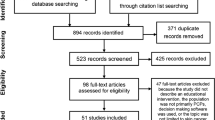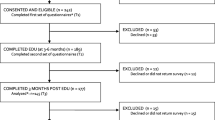Abstract
OBJECTIVE: To evaluate the effect of a 2-hour, multicomponent educational intervention on provider skin cancer control practices.
DESIGN: Nonrandomized intervention study. The intervention was a 2-hour curriculum designed to augment provider skin cancer control practices through instruction in basic skin cancer triage (BSCT) and a brief summary of skin cancer epidemiology, prevention, and counseling.
SETTING: Staff-model health maintenance organization in southeastern New England.
PARTICIPANTS: Convenience sample of primary care providers. Providers older than age 75, individuals in practice for less than 1 year, or individuals planning to retire in the next 2 years were excluded from the study. Twenty-two of 28 participants completed the study.
RESULTS: Providers completed preintervention and postintervention surveys asking them to rate their attitudes towards skin examination and skin cancer counseling and to rate the frequency of their skin cancer control practices, using 5-point Likert scales. We independently assessed provider behavior through surveys of their patients, eliciting information on provider practices before and after BSCT participation. Following participation in the curriculum, there was significant improvement in provider attitudes towards the total body skin examination but not towards skin cancer prevention counseling. Significant increases in provider self-reported skin cancer control practices during an initial visit with a new patient (2.17 to 3.21, P<.0001) and a routine visit with a patient at high risk for melanoma (2.15 to 3.00, P<.0001) were demonstrated. Patient exit interviews independently confirmed these changes in practice patterns.
CONCLUSIONS: The study results suggest that the BSCT curriculum may be a useful tool in increasing the practice of skin cancer control measures by primary care providers.
Similar content being viewed by others
References
Weinstock MA, Goldstein MG, Dube CE, Rhodes AR, Sober AJ. Basic skin cancer triage for teaching melanoma detection. J Am Acad Dermatol. 1996;34:1063–6.
Federman DG, Concato J, Caralis PV, Hunkele GE, Kirsner RS. Screening for skin cancer in primary care settings. Arch Dermatol. 1997;133:1423–5.
Weinstock MA, Martin RA, Risica PM, et al. Thorough skin examination for the early detection of melanoma. Am J Prev Med. 1999;17:169–75.
Nelson C, Woodwell D. National Ambulatory Medical Care Survey: 1993 summary. Vital Health Stat 13. 1998;(136):iii–iv, 1–99.
Kirsner RS, Muhkerjee S, Federman DG. Skin cancer screening in primary care: prevalence and barriers. J Am Acad Dermatol. 1999;41:564–6.
Walsh JM, McPhee SJ. A systems model of clinical preventive care: an analysis of factors influencing patient and physician. Health Educ Q. 1992;19:157–75.
Prochaska JO, Velicer WF, Rossi JS, et al. Stages of change and decisional balance for 12 problem behaviors. Health Psychol. 1994;13:39–46.
Dolan N, Ng JS, Martin GJ, Robinson JK, Rademaker AW. Effectiveness of a skin cancer control educational intervention for internal medicine housestaff and attending physicians. J Gen Intern Med. 1997;12:531–6.
Girgis A, Sanson-Fisher RW, Howe C, Raffan B. A skin cancer training programme: evaluation of a postgraduate training for family doctors. Med Educ. 1995;29:364–71.
Author information
Authors and Affiliations
Corresponding author
Additional information
This project was supported by grant MS00011 from the Agency for Health Care Research Quality and grant AR43051 from the National Institutes of Health.
Rights and permissions
About this article
Cite this article
Mikkilineni, R., Weinstock, M.A., Goldstein, M.G. et al. Impact of the basic skin cancer triage curriculum on providers’ skin cancer control practices. J GEN INTERN MED 16, 302–307 (2001). https://doi.org/10.1046/j.1525-1497.2001.00626.x
Issue Date:
DOI: https://doi.org/10.1046/j.1525-1497.2001.00626.x




